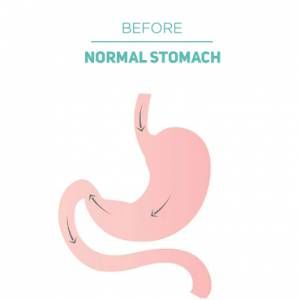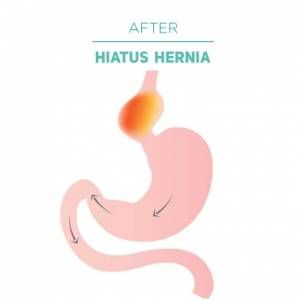Hiatus Hernia treatment in Dubai

A Hiatus Hernia is a type of hernia which occurs inside the body. In this condition, the stomach partially pushes up into the chest by squeezing through an opening (hiatus) in the diaphragm. A diaphragm is a thin, large sheet of muscle separating the chest from the abdomen.
A Hiatus Hernia allows stomach contents, particularly stomach acid, to move up into the oesophagus. This normally causes heartburn and other associated problems. When Hiatus Hernia causes chronic heartburn, it is treated laparoscopically. Dr Girish Juneja is renowned for providing the best Hiatus Hernia treatment in Dubai.


What causes Hiatus Hernia?
A Hiatus Hernia is mainly caused due to weakened muscle tissue which your stomach to push up through your diaphragm. The other causes and risk factors of Hiatus Hernia are:
- Age-related changes or any injury in your diaphragm
- Being born with a hiatus hernia.
- Persistent pressure on the muscles of the stomach or abdomen while coughing, bending, vomiting, straining during a bowel movement, exercising or lifting heavy objects.
- This condition can affect anyone, but it is more common in people over the fifties, smokers, and people who are overweight/obese or pregnant.
What are the symptoms of Hiatus Hernia?
Small Hiatal hernias show no symptoms. But symptoms of larger Hiatal hernias are:
- Heartburn
- Splashing up of food or liquids into the mouth
- Backflow of stomach acid into the oesophagus
- Difficulty swallowing
- Chest or abdominal pain
- Shortness of breath/ chronic cough
- Vomiting of blood
- Symptoms of Asthma/Croaky voice
- Black stools which indicate gastrointestinal bleeding
What happens if Hiatus Hernia is left untreated?
- A Hiatus Hernia may cause a feeling of food trapping in the oesophagus or fullness after eating a small amount of food.
- Sometimes a large portion of the stomach is trapped in the chest, and it makes the patient suffer so much. In such conditions, eating a large meal may cause breathlessness irregular heartbeat, as the enlarged stomach puts pressure on the lungs or heart.
- A Hiatus Hernia can lead to acid reflux into your oesophagus, causing heartburn. The acid reflux can also lead to ulcers or even blood vomit.
- The Hiatus Hernia also increases the risk of Barrett oesophagus cancer.
- If the condition gets beyond control, you should go for hernia surgery.
How is Hiatus Hernia Diagnosed?
A hiatal hernia can be diagnosed through a few tests. These tests or procedures include:
- Barium swallow – A contrast (barium) solution is given to the patient that coats and fills the inside lining of your digestive tract. This helps your doctor to see your oesophagus, stomach, and upper intestine in x-ray
- Endoscopy– Your doctor, under IV sedation, inserts an endoscope which is a thin, flexible tube fitted with a light and camera, down your throat to examine the inside of your oesophagus and stomach to confirm & check for any inflammation/ complications.
- Oesophagal manometry – It is done to measure the motility in your oesophagus when you swallow.
Hiatus Hernia Treatment in Dubai
The various methods of treatment aim for acid reflux cure, which prevents acids from flowing back into the oesophagus by either preventing reflux into the oesophagus or by reducing the amount of stomach acid produced.
Following a healthy lifestyle may help them. Those people who are suffering from hiatal hernia should avoid alcohol, caffeinated drinks, chocolate, and foods that increase the production of acid. Take smaller means and foods which are fibre-rich.
Our hernia surgery doctor in Dubai first tries to treat the condition with medications as medications can usually relieve its symptoms. But if these treatments fail, it might require surgery.
The abdominal hernia surgery in Dubai is done as laparoscopy. In this surgery, doctors make three to four small incisions into the abdomen; then the doctor will use a laparoscope which will guide him & during the procedure, the stomach is placed into the correct position, and the diaphragm is tightened.
After Surgery – Recovery
Most people do not experience much pain after laparoscopic surgery, but they may feel discomfort in their abdomen and chest. Sometimes they may feel difficulty in swallowing for a few days post laparoscopy. As this procedure requires a minimum invasion, there are not many risks involved. A person may go home the same day or the next morning. Most people can return to their regular diet after a month of surgery & can stop taking heartburn medications.
Why choose Dr Girish Juneja for your Hiatus Hernia Treatment in Dubai?
Dr Girish Juneha is a well-experienced surgeon who is known for practising advanced laparoscopic surgery in Dubai on local & international patients. Therefore, you can count on him & his surgical team for the best results & safety.


